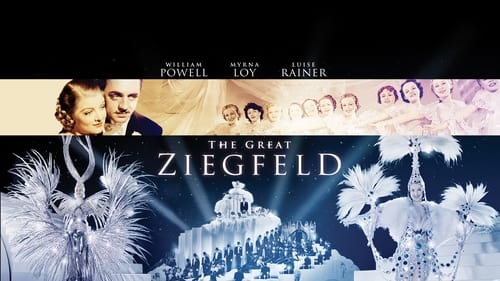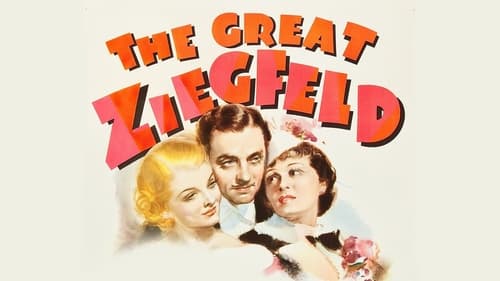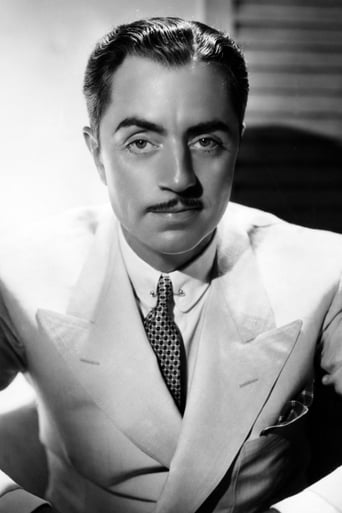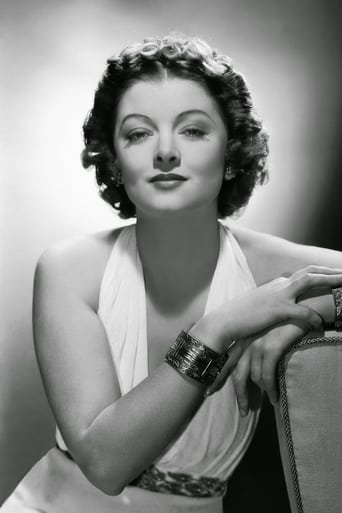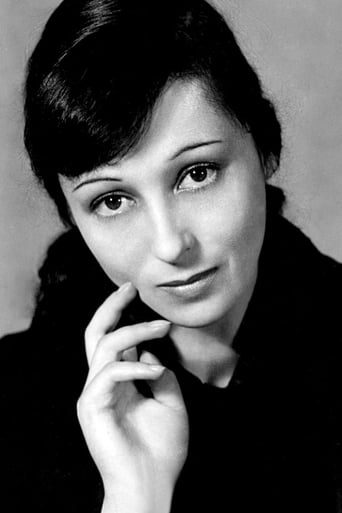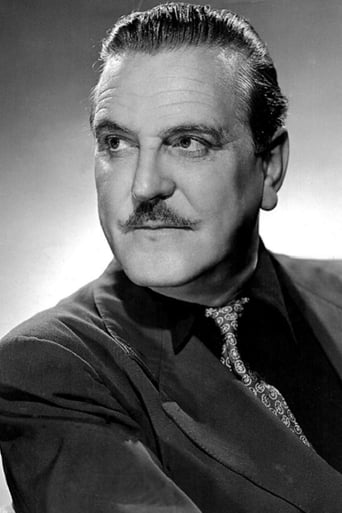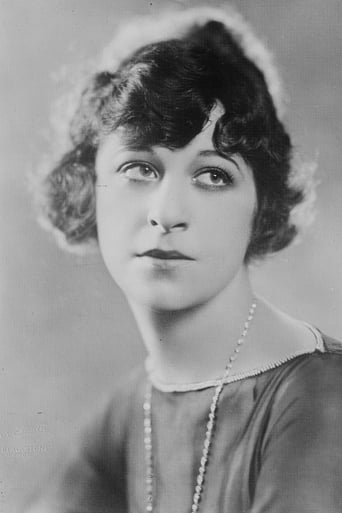Evengyny
Thanks for the memories!
Boobirt
Stylish but barely mediocre overall
TrueHello
Fun premise, good actors, bad writing. This film seemed to have potential at the beginning but it quickly devolves into a trite action film. Ultimately it's very boring.
kijii
I first saw this 3-hour movie on the big screen in the late 70s, and was happy to see it on a large screen. It won three impressive Oscars in 1936: Best Picture, Best Actress (Luise Rainer), and Best Dance Direction. It was also nominated for three more Oscars: Best Director (Robert Z Leonard), Best Writing (Original Story), Best Art Direction, and Best Film Editing. Luise Rainer won her first of two consecutive Oscars here and was the first performer ever to do this: her second Oscar was for The Good Earth (1937).Here, MGM paired William Powell with Myrna Loy in part of the 13 movies they made together in the 30s and 40s: Manhattan Melodrama (1934); The Thin Man (1934); Evelyn Prenice (1934); The Great Ziegfeld (1936); Libeled Lady (1936); After the Thin Man (1936); Double Wedding (1937); Another Thin Man (1939); I Love You Again (1940); Love Crazy (1941); Shadow of the Thin Man (1941); The Thin Man Goes Home (1945); and Song of the Thin Man (1947). Although The Great Ziegfeld is only a fairly routine biopic of Flo Ziegfeld from the Chicago World's Fair of 1893 until his death in 1932, the movie is spectacular for his sets, decoration and starring cast, including appearances by some of his own stars: Fanny Brice, Harriet Hoctor, and Ray Bolger. One wonders why Eddie Cantor (played by Buddy Doyle) did not appear as himself in this movie. Will Rodgers (played by A.A. Trimble) had died in that small plane crash in 1935 before this movie was made. To our great fortune, this movie was made fairly soon after Ziegfeld's death when there were people who could still remember the Ziegfeld Follies with their lavish stairs, songs, and above all, his beautiful girls!! This movie is in black and white, but one can get an idea of what it might have been like in color from watching Funny Girl (1968).The movie opens with Flo Ziegfeld (William Powell) and his friend/rival Jack Billings (Frank Morgan) competing with each for attention to their respective attractions at the Chicago World's Fair of 1893. Ziegie's big attraction is Sandow the Strongman (Nat Pendleton) while Billings was a belly dancer, Little Egypt. Later, while in Europe, Ziegfeld bests Billings out of signing the French singer Anna Held (Luise Rainer) to a contract and then marries her. Later, after starting the Follies and having trouble with one of its stars, Audrey Dane (Virginia Bruce), Anna oversees the troublesome Audry kissing Flo while drunk and mistakes her drunken kiss for a real kiss. Anna then files for divorce. Flo's second wife is Billie Burke (played by Myrna Loy) to whom he is married for the rest of his life. Zeigfeld goes on to produce and promote several shows and reviews on Broadway, often with other people's money. Near the end of the movie, while overhearing four men in a barbershop saying that "Zeigfeld is all washed up," he promises to make four Broadway successes within a year and have them all playing at the same time. After making good on his bet, he hires private investigators to find the four original men and gives them all box ticket seats to all of his four plays. The four musical successes all played on Broadway at the same time—The Three Musketeers, Showboat, Rio Rita, and Whopee!
sinel-47034
This movie follows the career of the famous showman/ swindler Florenz Ziegfield. Ziegfield is a very likable swindler, however, and William Powell plays him magnificently. The Ziegfield character could easily be detestable in the hands of another actor (as I suspect the real Ziegfield was).The movie may be a "valentine" to an extremely powerful producer, but it is still entertaining fare today, provided the viewer: a) is a fan of old movies (unlike me); b) is a fan of movie musicals (unlike me); and c) is a fan of big production numbers, even those shot in "glorious black & white" (unlike me).
TheLittleSongbird
Knowing several people, on and outside of IMDb, who consider The Great Ziegfeld one of the weakest Best Picture winners, that didn't stop me from seeing it anyway. To me though, while it's not flawless and not the best film of the year it was still incredibly well-made and entertaining stuff and from personal view it is nowhere near one of the worst Best Picture winners.The Great Ziegfeld agreed is overlong with a draggy and at times uneventful first half and half an hour could easily have been trimmed. And more could have done with the relationship between Ziegfeld and Billie Burke which appeared late in the film and didn't feel developed enough, almost like an afterthought.However, The Great Ziegfeld is very lavishly mounted, with photography that's both beautiful and clever, sumptuous costume design and some of the most handsomely gorgeous sets of any 30s musical. Other pleasures are the marvellous and very well-staged(without being too overblown) songs with A Pretty Girl is Like a Melody being an absolute show-stopper, a script peppered with humour and heart and the mostly poignant story. Standout scenes were Fanny Brice's charming My Man, Ray Bolger's witty dancing to My Follies Girl, Luise Rainer's heart-breaking telephone(justifiably famous) and especially A Pretty Girl is Like a Melody with its clever photography and perhaps one of the best uses of a staircase in a film. The direction is adept and the performances are great, with William Powell suave personified and especially Luise Rainer who is the epitome of charm and grace, capable of a good range of emotions as seen in the telephone scene. Fanny Brice, Frank Morgan, Ray Bolger are all memorable, while Myrna Loy is underused she's hardly wasted either.Overall, a well-made, entertaining and very good film and well worth the look. 8/10 Bethany Cox
John T. Ryan
AS WE CHOSE to make this our next, lucky victim to be vetted before America and the World, we first did our homework. Consulting such esoteric sources of knowledge as the World Book Encyclopaedia and our own personal favourite, Wikipedia, we stockpiled a treasure trove of background information about the famous Mr. Florenz Ziegfeld, Jr.BORN IN CHICAGO (coincidently our home town!), he was the product of a German Lutheran Immigrant and a Belgian Roman Catholic Mother. Father ran the CHICAGO MUSICAL COLLEGE and opened a nightclub, the Trocadero, in time to ca$h in on the glut of business in the Windy City during the WORLD'S COMUMBIAN EXPOSITION of 1893.IT WAS AT this point when Ziegfeld the Younger contracted with European Stage Strongman, Eugen Sandow and proceeded to employ his act at the Trocadero, as well as at the Midway* of the Fair; which was being held at the Jackson Park Lakefront sight.HERE IS WHERE our story begins in the film, THE GREAT ZIEGFELD (MGM, 1936).THE STORY OPENS with Sandow's feats of strength bringing only modest receipts at the gate. Ziegfeld (William Powell) suggests that Sandow** (Nat Pendelton) should put the Barbell lifting and Horse Shoe bending on the back burner in favor of physique display. Striking various poses, from all angles, Sandow would animate the presentation with routines employing "muscle control"; which is the contraction and relaxation of the various muscular groups, without actually moving anything.ZIEGFELD QUICKLY MOVES on to the vaudeville stages and to Broadway, producing musicals, discovering lovely female performers and culminating with his greatest triumph, the ZIEGFELD FOLLIES.TAKING THE NAME from the famous Parisian FOLLIES BERGERE, they were the most widely popular musical extravaganzas in America or even the World. The story traces their development and chronicles their year by whomever kit is that Flo is featuring as his headliner. Will Rogers, Fanny Brice, W.C. Fields and Eddy Cantor were among his finds.A VERY HUGE AND outstanding cast was assembled in order to give the film the importance that such a biography deserves. In addition to William Powell, we have: Myrna Loy (Billie Burke-wife # 2)), Louise Rainer-Wife # 1), Frank Morgan, Fanny Brice (playing herself), Virginia Bruce, Reginald Owen, Ray Bolger (as Eddie Cantor) and a cast of hundreds (at least).THE NEARLY THREE hour film traces a career that was built on manic energy and confidence. It has highs and lows with romance and heart break, family and solitude, reverence and vulgarity. It covers his life respectfully, right up to his death bed in 1932.WE HAVE TO address on point before waving bye-bye. As to the notion that Ziggy launched the career of Sandow, many feel that it was really the other way around; for, without Sandow, we'd have never known Mr. Ziegfeld.THIS MARATHON OF a movie gets a highest mark from us, just be in the mood to invest the time.***NOTE * The term "Midway" originated at the 1893 Fair; being the roadway leading to the Fair Grounds, which was lines with all of those "Side Show Attractions." In this case, Sandow and Fan Dancer, Sally Rand were among them.NOTE ** Nat Pendelton's characterization of Sandow makes him sound more like a Hollywood Indian, rather than the German, which he was. He was born in Prussia, April 2, 18967 as Frederick Mueller. He is considered to be the Father of Modern Bodybuilding, Physical Culture and Physique Display (Those "Mr." Contests). The Trophy for the Mr. Olympia contest is called the 'Sandow' Trophy.NOTE *** The popularity of the movie spawned a sort of Musical/Fantasy follow-up with ZIEGFELD FOLLIES (MGM, 1945); again featuring William Powell as a now resident of Heaven, scanning how things are on Planet Earth through telescope and making commentary directly to the audience!


